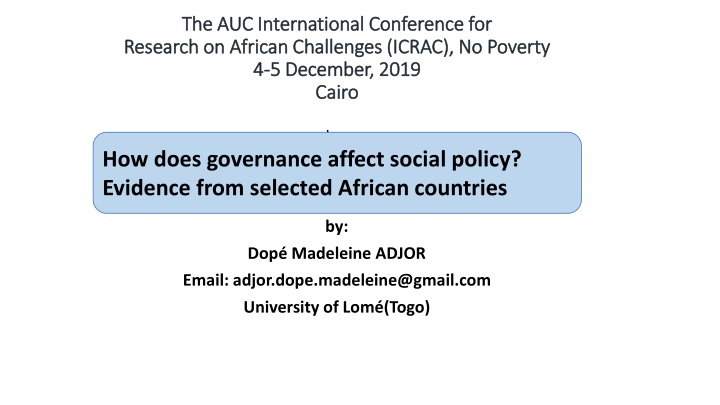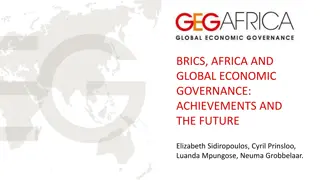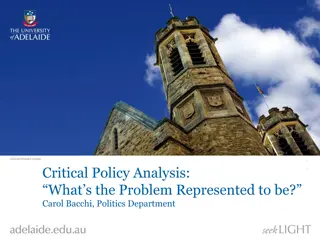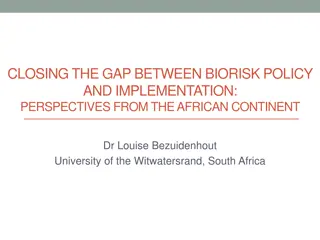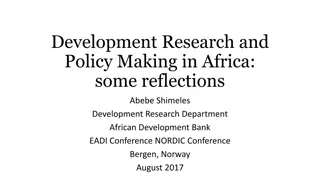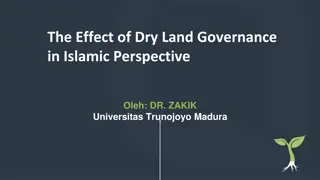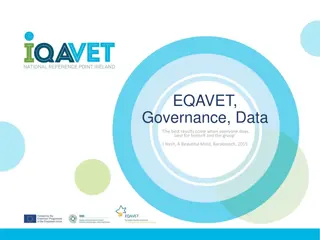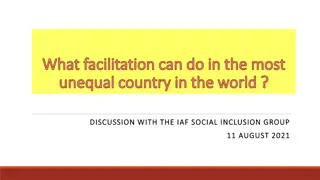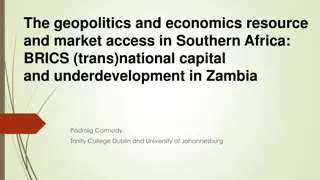Governance Impact on Social Policy in Africa: A Research Perspective
Sustainable development in Africa hinges on effective governance. Explore the correlation between governance and social policy impact on health and education spending in Sub-Saharan Africa. Analyze trends, challenges, and implications to address poverty and underdevelopment.
Download Presentation

Please find below an Image/Link to download the presentation.
The content on the website is provided AS IS for your information and personal use only. It may not be sold, licensed, or shared on other websites without obtaining consent from the author.If you encounter any issues during the download, it is possible that the publisher has removed the file from their server.
You are allowed to download the files provided on this website for personal or commercial use, subject to the condition that they are used lawfully. All files are the property of their respective owners.
The content on the website is provided AS IS for your information and personal use only. It may not be sold, licensed, or shared on other websites without obtaining consent from the author.
E N D
Presentation Transcript
The AUC International Conference for The AUC International Conference for Research on African Challenges (ICRAC), No Poverty Research on African Challenges (ICRAC), No Poverty 4 4- -5 December, 2019 5 December, 2019 Cairo Cairo by: ADJOR Dop Madeleine Email: adjor.dope.madeleine@gmail.com University of Lom (Togo) Evidence from selected African countries How does governance affect social policy? by: Dop Madeleine ADJOR Email: adjor.dope.madeleine@gmail.com University of Lom (Togo)
Outline 1. Introduction and background 2. Objectives 3. Justification 4. Methodology 5. Results 6. Conclusion and policy implications
Introduction and background looser and wider distribution of both internal and external political and economic power (Leftwich, 1993) Governance failure of institutions economic inadequacies social disintegration poverty and underdevelopment weak delivery of public goods essential in the fight against poverty deficient governance deterioration of institutions of state and society
Introduction and background It has been argued that sustainable development can only be guaranteed by the existence of effective, strong, accountable and legitimate governance mechanisms. According the Mo Ibrahim index of Africa governance which is a tool that measures and monitors governance performance in African countries, the average score of African countries in 2017 is 49.9 out of 100 which is the highest governance score of the last ten years (2008- 2017), in 2017 the 5 Top countries with the highest governance index are Mauritius (79.5), Sechelles (73.2), Cabo verde (71.1), Namibia (68.6) and Botswana (68.5).
Introduction and background Trend of Governance, Health and Education indicator in Africa mean from 2008-2017 70 60 Mean 50 40 2008 2010 2012 2014 2016 2018 Year OVERALL GOVERNANCE HEALTH EDUCATION
Introduction and background Poor governance does not hinder economic growth and social development trough social policy. democracy has no effect on social expenditures (health expenditures) In democratic regimes social spending (health expenditures) are more pronounced). what is the effect of governance on social policy, particularly health and education spending in Sub- Saharan Africa (SSA)?
Objectives determine the effect of democracy on education and health expendicture in SSA The main objective of our paper is to determine the effect of governance on social policy in SSA determine the effect of corruption on education and health expendicture in SSA
Justification This study is justifying in the sense that: in recent Year, African governments, the donor community, multilateral agencies, and regional intergovernmental bodies like the African Union (AU) have placed high priority on social policy as an instrument for reducing poverty, vulnerability, unemployment and underemployment in Africa Social spending programs are important political issues, and it would be interesting to know how political systems affect the amount spent by the public sector
Methodology (Empirical model) ?????= ??+ ???????+ ????+ ??? ??????= ??+ ???????+ ????+ ???
Methodology (Data and estimation technique) Sample: 45 SSA Countries Period: 1995 2015 Sources of data: -Freedom House -Mo Ibrahim Governance Index - WDI: World Development Indicator Estimation technique Panel data fixes effects estimation
Results (descriptive analysis) Variable Obs Mean Std. Dev. Min Max GDP per capita 935 1458,02 2494,38 2,40 22742,38 polity2 941 1,51 5,32 -9 10 Gov Education expendicture % of GDP Health expendicture % GDP 945 4,25 1,45 1,01 13,22 945 2,55 1,37 0,04 9,09 Population 920 1,74E+07 2,54E+07 389127 1,81E+08 Corruption Index 945 27,82 11,59 7 70
Results (descriptive analysis) Mean Government expenditure on education, total (% of GDP) 3 3 4.6 Mean Health expenditure, public (% of GDP) 2.8 2 4.4 Mean polity2 2.6 1 4.2 2.4 0 4 2.2 -1 1995 2000 2005 year 2010 2015 3.8 2 1995 2000 2005 year 2010 2015 1995 2000 2005 year 2010 2015
Results (descriptive analysis) mean of OVERALLGOVERNANCE 80 mean of EDUCATION 80 60 60 40 40 20 20 0 Central African Republic Liberia Nigeria Democratic Republic of Congo Uganda Djibouti Namibia Rwanda Senegal Swaziland Cameroon Equatorial Guinea Mauritania Cabo Verde Mozambique Sierra Leone Chad Benin Libya Seychelles Algeria Congo Sudan Guinea-Bissau Angola Malawi Guinea Tunisia Burundi Madagascar Somalia Lesotho Ethiopia Niger Tanzania Botswana Zimbabwe Comoros Mauritius Mali C te d'Ivoire Togo Kenya Burkina Faso Ghana Eritrea Gabon Zambia Gambia Morocco Egypt South Africa S o Tom & Pr ncipe 0 Equatorial Guinea Sierra Leone Central African Republic Liberia Ethiopia Djibouti Senegal Mauritania Democratic Republic of Congo Cabo Verde C te d'Ivoire Benin Sudan Algeria Congo Angola Tunisia Nigeria Guinea Burundi Lesotho Uganda Somalia Rwanda Namibia Tanzania Niger Swaziland Cameroon Zimbabwe S o Tom & Pr ncipe South Africa Burkina Faso Mozambique Mali Togo Guinea-Bissau Libya Chad Madagascar Eritrea Kenya Ghana Gabon Zambia Egypt Mauritius Malawi Gambia Botswana Seychelles Comoros Morocco
Results (Econometric analysis) (1) (2) (3) (4) VARIABLES Government expenditure education Government expenditure education Health expenditure Health expenditure polity2 0.0556*** (0.0167) 3.87e-06 (2.56e-05) 8.72e-09 (8.01e-09) 0.0530*** (0.0169) 4.79e-06 (2.56e-05) 8.94e-09 (8.01e-09) -0.00525 (0.00522) 4.206*** (0.201) 915 0.019 0.0663*** (0.0119) 5.19e-05*** (1.82e-05) 2.73e-08*** (5.71e-09) 0.0713*** (0.0120) 5.02e-05*** (1.82e-05) 2.69e-08*** (5.69e-09) 0.01000*** (0.00371) 1.543*** (0.143) 915 0.103 GDP per capita Population Corruption Constant 4.060*** (0.138) 915 0.018 1.821*** (0.0986) 915 0.096 Observations R-squared Number of countries 44 44 44 44
Conclusion and policy implications Conclusion and policy implications Countries that have high level of democracy tend to spend more on education and health. Less corrupt countries spend more on social policy The level of wealth of a country is correlated with health expendicture That countries that have good governance are on top in term of social policy implementation.
Conclusion and policy implications Our results have important implications for enhancing the development effectiveness of social policy Our findings are relevant for developing countries, especially African Countries where there is an ongoing debate on how to achieve the sustainable Development Goals (SDGs) specifically the first one End poverty in all its forms everywhere policy maker should establish strong institutions and implement the elementary rules of democracy
Conclusion and policy implications The rules of democracy will help government to allocated his resources to poverty reduction programs especially spend efficiently in essential services (education, health and social protection). Measures adopted such as implementation of democracy rules and fight against corruption are therefore essential to national development strategies aimed at reducing poverty and vulnerability throughout the life cycle
